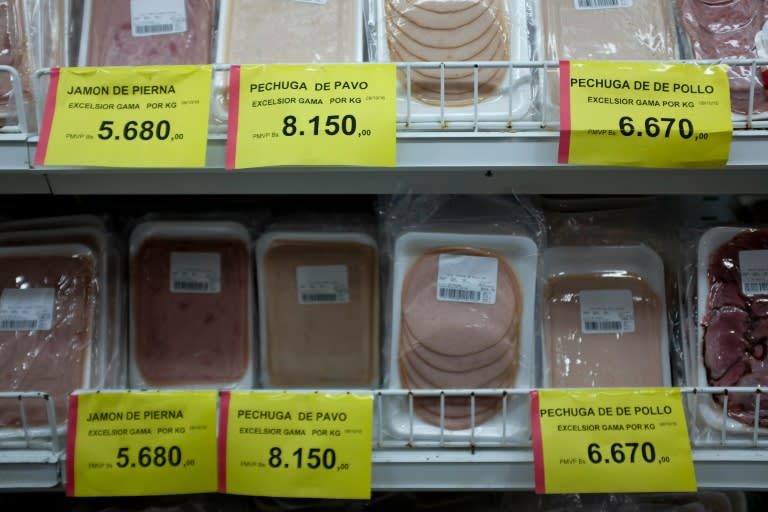Food back in Venezuelan markets, but who can afford it?
Food staples like rice and milk are returning to the empty shelves of Venezuelan supermarkets after a long absence -- but who can afford those eye-popping prices? Delia Mendoza's eyes widen when she realizes that the price for half a kilo of red beans is 4,211 bolivars, or $6.40 at the highest official exchange rate. This in a country where the monthly minimum wage is around $100. "Incredible!" she gasps, and returns the beans -- a staple of Venezuelan cuisine -- to the shelf. In recent months, the leftist government of President Nicolas Maduro has begun to relax its price control system, allowing food sales at market prices in several Venezuelan states and, to a limited degree, in the capital Caracas. That is a sea change for a country where strict price controls had been imposed since 2003 -- a lynchpin of the socialist "revolution" launched by Maduro's late predecessor and mentor, the iconic president Hugo Chavez. "In a way, the government has turned a blind eye to this with all the regulations they have implemented," said Asdrubal Oliveros, head of Ecoanalitica consultants. "This has allowed many companies, many importers to start bringing in products, and those products are being sold at black market prices." Many economists blame the scarcity on the strict price controls, together with tight currency exchange limits and Venezuela's over-dependence on its vast oil reserves, which has made it rely on imports for goods it once made at home. Lacking easy access to greenbacks, businesses are starved for US dollars needed to buy supplies and equipment available only abroad. Now that the price control system is crumbling, Venezuelan businessmen are starting to bring in imports again -- but at a high price. - $17 cooking oil - "There is plenty, but everything is super expensive and imported because nothing is made here," said Mendoza, a 75 year-old retiree, speaking at a supermarket in a posh Caracas neighborhood. "Before, I'd eat a large plate of spaghetti, but now I go for half so that it will last two days," she said. Venezuela is paying a heavy price for neglecting agribusiness and food production over the years to concentrate on petroleum, the source of 96 percent of its foreign currency. With global oil prices in a slump, the country's economy is in a tailspin and inflation is out of control. The IMF predicts that Venezuela's inflation rate, already the world's highest, will reach 475 percent by year's end -- and with no changes, a whopping 1,660 percent in 2017. The cash-strapped government has even increased the price of household items in government-subsidized markets, which in any case are hard to find. The stores lucky enough to sell imported products like sugar, rice and cooking oil set their prices at the black market rate -- where US dollars go for twice the official exchange rate -- to recover their investment. At these prices, 500 grams of Italian pasta costs 4,000 bolivars ($6), a dozen eggs can cost $3, while a liter of cooking oil costs $17. While a liter of milk in Costa Rica costs $1.50, that same product costs nearly $4 when imported to Venezuela. - Wanted: food - Regular Venezuelans struggle every day just to find food, much of which is unavailable at any price. A woman named Judith stands in line for long hours at a government-subsidized market, where a bag of beans costs 280 bolivars ($0.40) -- when it's even available. "The problem is that we can't find anything," she says. Judith certainly doesn't make enough to buy food from black-market vendors known as "bachaqueros," who resell scarce products with gargantuan markups, sometimes 40 times the original price. A family food basket at black market prices can cost nearly 160,000 bolivars ($242 at the official rate) according to the firm Hinterlaces -- or nearly 360,000 ($535) according to a different group, the Center of Documentation and Analysis. "Sometimes we have nothing to eat, we go hungry because there's nothing," said another shopper, Edith, who stood in line alongside her husband Edward.

 Yahoo Finance
Yahoo Finance 



